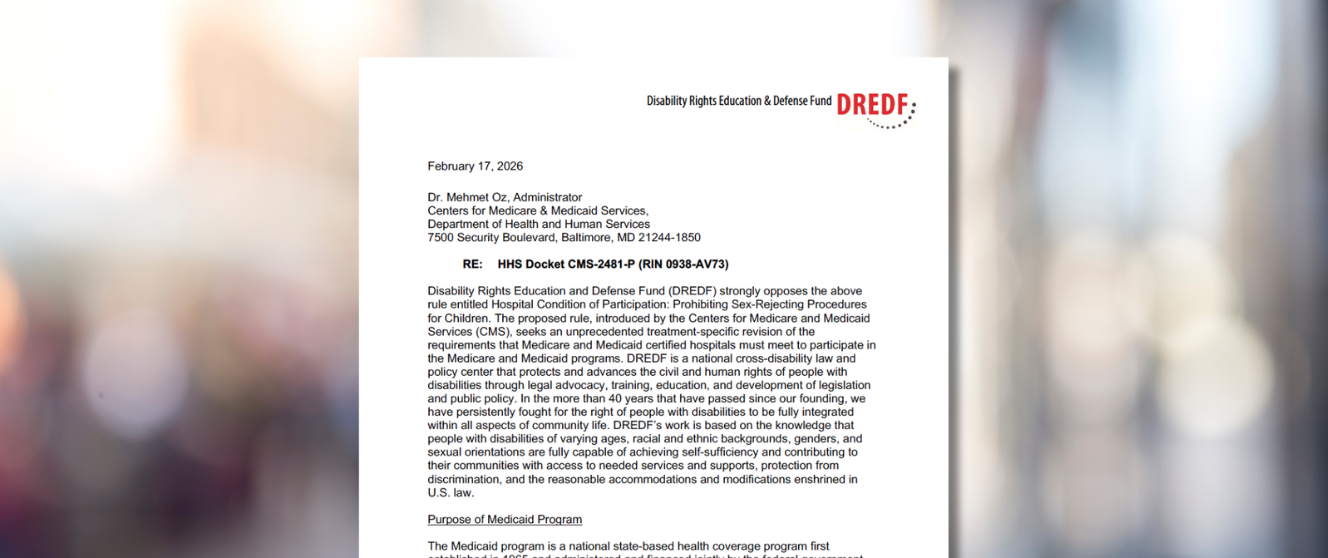
This page is being preserved for historical record and future reference, even though it may no longer be actively used or up to date.

The Trump Administration’s Supreme Court nominee Brett Kavanaugh’s confirmation hearings are scheduled to begin Tuesday, September 4 and last between three and four days, Judiciary Chairman Chuck Grassley (R-Iowa) announced on Friday, August 10.
The Disability Rights Education & Defense Fund opposes the nomination of Judge Kavanaugh to the Supreme Court of the United States.
“We hold these truths to be self-evident, that all men are created equal.” This Declaration of Independence was written by the same founders who made our Constitution the supreme law of the land and divided the balance of power between three distinct branches of government to guard against authoritarian rule. As one of those three branches, the Judiciary’s primary role is to make certain that the Legislature passes laws, and the Executive administers those laws, in ways that respect key principles of the Constitution. Since 1789, the Supreme Court has held a unique and necessary position as the judicial last resort for individuals who seek justice in court and is, in effect, the final interpreter of the United States Constitution. In essence, the U.S. Supreme Court exists to ensure that fluctuating views of those with political influence or power do not undermine the fundamental core values that have consequences for, and are dear, to us all: individual liberty, equality, majority rule with inalienable minority protections.
People with disabilities understand that every person has equal worth, but is not necessarily treated as equal in a world with systemic discrimination and embedded imbalances of economic, political, social and cultural power. Civil rights laws like the Americans with Disabilities Act are needed so that people have freedom from overt discrimination, but also ensure that existing barriers do not prevent freedom to do, to have real choices, to live in the community, to participate fully and independently in American life with appropriate supports. The passage of the Affordable Care Act (ACA) gave people with disabilities another guarantee, healthcare coverage, to further expand access to equal participation.
On the three occasions that Judge Kavanaugh deliberated on the ACA, he broke with his judicial colleagues, writing dissenting judgments that characterized the ACA as “unprecedented on the federal level in American history” and warning that the judiciary should “exercise great caution” in determining its constitutionality. In June 2018, the Department of Justice under the Trump administration sided with 20 states in a lawsuit against the ACA, and argued that the ACA’s requirement to cover people with preexisting conditions (legislative code for disabled) is unconstitutional. The case will be heard in a Texas district court and is expected to make its way to the Supreme Court, where, if appointed, Judge Kavanaugh has made his views on the ACA’s constitutionality unmistakably clear.
Judge Kavanaugh has also made his views clear on other critical areas of concern to people with disabilities:
- In Doe ex rel. Turlow v. D.C., Judge Kavanaugh decided that if a person with intellectual disabilities does not have the legal capacity to make medical decisions, she will also lack the right to have her wishes considered for elective surgery. The decision takes an all or nothing view that disregards a growing acknowledgement among states and courts that people with disabilities have levels of capacity, and governments and institutions need the check of being required to consider the desires of the individual.
- In employment discrimination cases, Judge Kavanaugh has routinely favored employers’ discretion and placed high evidentiary standards on employees to establish claims of retaliation or discrimination.
- Judge Kavanaugh has not written many special education decisions, but in his career has clearly supported school voucher programs, without ever apparently recognizing the common practice of requiring families of students with disabilities to contractually waive their federal rights to a free and appropriate education under the Individuals with Disabilities Education Act before entering the school.
- In his writings, Judge Kavanaugh has opined on “extraordinary duplication, overlap, and confusion among the missions of different agencies,” and then gone on to decide cases where he struck down an entire rule put out by the Environmental Protection Agency concerning air pollutants that travel across state lines. When the Supreme Court later overturned Judge Kavanagh’s decision 6-2, they noted that Judge Kavanaugh wrote “an unwritten exception” into the text of the Clean Air Act, and failed to “apply the text, [rather than attempt to] improve upon it.”
Judge Kavanaugh’s recent 2018 decision in PHH Corporation v. Consumer Finance Protection Bureau captured his hostility to independent federal agencies that are often charged with protecting consumer interests and civil rights, including the rights of people with disabilities. In his opinion, Judge Kavanaugh wrote that such agencies “pose a significant threat to individual liberty and to the constitutional system of separation of powers and check and balances.” The opinion reveals a concept of individual liberty that preserves an imagined status quo where individuals are already equal and the judiciary needs to restrain government interference, including action intended to eliminate long-standing biases and disparities. Thankfully, the full en banc hearing of the case by the Fifth Circuit overturned Judge Kavanaugh’s decision.
Arlene Mayerson, DREDF’s directing attorney reminded Disability Scoop on July 16 that Kavanaugh is known for striking down agency regulations, which often spell out the details of what statutes require. Architectural requirements, for instance, give the ADA teeth in providing full and equal access.
“He really is a poster boy for not honoring agency regulations,” Mayerson said. “We want more enforcement of our laws by the federal government, not less.”
DREDF’s review of Judge Kavanaugh’s available decisions and writings suggests that he does not understand what people with disabilities experience. This much seems clear: He will not protect civil rights. He will not ensure that people with disabilities, women, people of different races and ethnicities, different sexual orientations and gender identities, receive needed healthcare without discrimination. He will not ensure that parents of children with disabilities will not face the modern equivalent of Sophie’s Choice—trapped between options because of contradictory rules that force one to choose between getting one’s child the educational services that they need right now and giving up those rights under federal law. Instead, Kavanaugh’s record shows that he will override both Congressional laws and federal agency regulations when he determines that they go too far. On the other hand, he appears poised to cede judicial authority by giving the President wide discretion to decide which validly enacted laws are constitutional and which parts he prefers to ignore or actively undermine.
It doesn’t matter if Judge Kavanaugh is a nice guy. Serving on the Supreme Court is not only a matter of personal integrity or professional expertise. What matters is how he sees the world, how he interprets the role of the judiciary, and how he believes our time-honored system of checks and balances relates to corporate and political institutions and the power they hold over individuals with little economic or political influence who are subject to discrimination by those who do.
By the very nature of his job, Judge Kavanaugh’s words are his actions. Even though only 1% of Judge Kavanaugh’s words from his White House tenure have been made public, we know from his opinions who and what he questions (and what he does not), and who he gives a pass to. DREDF shares the informed alarm of other disability advocates and legal experts in the civil rights community about the long-lasting consequences of Judge Kavanaugh’s appointment to the United States Supreme Court.
For these reasons, DREDF vows to fight his nomination and we encourage those committed to our common core values of liberty, opportunity and equality to do the same.

